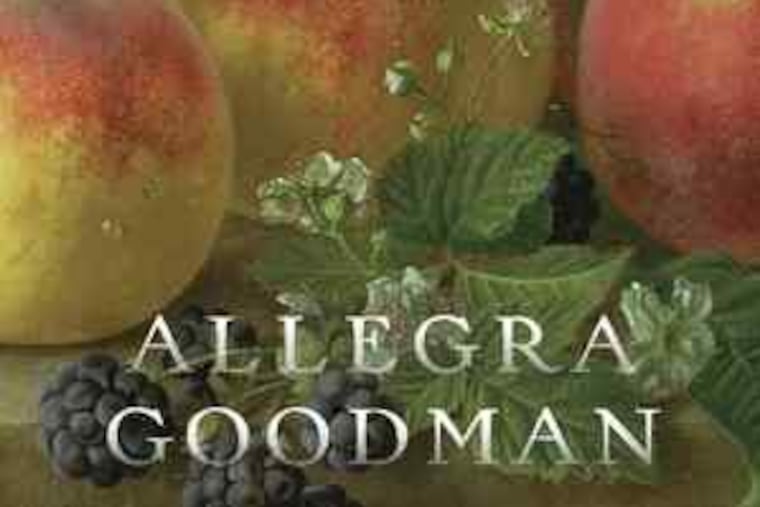Ambition dissected, as the wheel turns
Allegra Goodman's enchanting and sensuous new novel operates in pairs and opposites. Two sisters, one of them with two suitors. Two worlds, separate, even as they coalesce.

By Allegra Goodman
Dial Press. 394 pp. $26
nolead ends nolead begins
Reviewed by Jeffrey Ann Goudie
Allegra Goodman's enchanting and sensuous new novel operates in pairs and opposites. Two sisters, one of them with two suitors. Two worlds, separate, even as they coalesce.
In The Cookbook Collector, Goodman has written a romance that dissects ambition with a jeweler's precision and a culinary novel with a collection of rare cookbooks at its core. She also has produced a novel of ideas peopled by full-blooded characters. This taxonomy of dot-com ambition is a narrative about the turning of the wheel of fortune, the one the ancients and medievals believed in, not the one co-opted by television.
Set at the turn of the millennium, the sisters, transplants from New England, live in the San Francisco Bay area but in worlds separated by personality, values, and style. Jess, 23, a graduate student in philosophy, distributes leaflets for an organization called Save the Trees. At the same time, she works in a rare book store, Yorick's, full of books made of, yup, dead trees.
Emily, her older sister by five years, is, at the tender age of 28, the CEO of a flourishing data storage start-up she has named Veritech. She is involved with Jonathan, head of a data security start-up called ISIS on the East Coast. Jess mistrusts her sister's boyfriend.
Emily is flying high within the dot-com bubble. She is focused and practical, as well as thoughtful, ethical, and kind. Jess is "whimsical." Where Emily wears power suits, Jess dresses in oversized clothes. Where Emily is methodical, Jess is more reflective.
Jess is also slogging through graduate school, stuck in her objections to material she finds stuffy and starchy, wandering in a thicket of incompletes. Emily is scandalized when Jess becomes involved with the 30-ish head of Save the Trees, an idealist who has hardened into an ideologue.
Jess and Emily both set off on a paper chase. Emily's company goes public, and all its employees become instantly rich, at least on paper. Jess is in pursuit of a different kind of valuable paper, a vintage cookbook collection. The collection's owner has approached George Friedman, the owner of Yorick's, who enlists Jess' help.
A millionaire who retired early from Microsoft, George, is a handsome relic, with refined tastes in food, wine, and books. When George tells his friend Nick that Jess has called Ruskin "a dogmatic, self-indulgent, sexually repressed misogynist with an edifice complex," Nick jokes that she has also described George. George does love the house he is restoring to the vision of architect Bernard Maybeck, its designer.
With her natural trust in other people, Jess wins over Sandra, the skittish owner of the 873 cookbooks. Hidden in the kitchen cabinets of Sandra's late uncle, a lichenologist, the cookbooks span the earliest palm-size cooking guides to later disquisitions on running a household. But they are all stuffed with notes and erotic drawings by the never-married, reclusive Tom McClintock.
When George asks Jess to catalog the newly acquired collection, she begins working several hours a day in his lovely home. She pores over the cookbooks and slides into an unlikely romance with George, 16 years her senior, as skeptical and contrarian as Jess is open and vulnerable.
When the dot-com bubble bursts, the stocks of Emily's and Jonathan's firms plummet. The overly ambitious Jonathan betrays Emily's trust, not in the bedroom, but in his company boardroom.
But the wheel has turned, and the dot-coms are on their way down. When the century turns further and Sept. 11, 2001 dawns, one of the planes that crashes upends Emily's life. But losses contain the seeds of gains in this hopeful novel.
With many winks and literary references, The Cookbook Collector is a work of literary art with dollops of scholarship. Like Intuition, Goodman's adult novel prior to this one, The Cookbook Collector explores the difference between opportunity and opportunism. But this book is better: more mature, more generous, more expansive, and complicated.
If this novel of ambition can be faulted, it is perhaps too ambitious, with a few too many narrative ingredients. I haven't even mentioned the spicy subplots involving rabbinical relatives and a dreamy, poetic programmer.
The main dishes - and particularly the one belonging to George and Jess - are expertly prepared, delectable, and satisfying.